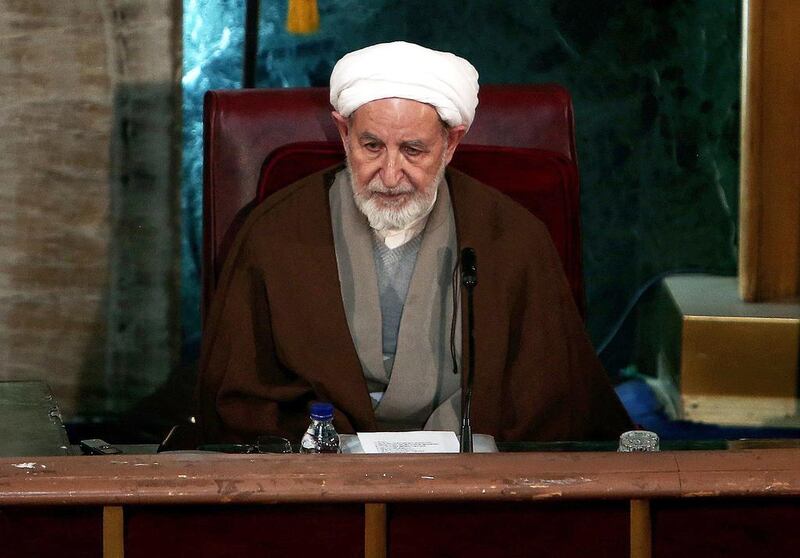ABU DHABI // The appointment of an ultraconservative cleric as head of Iran’s most influential council is a signal that hardliners want to highlight their power as the deadline for a framework deal with world powers over Tehran’s nuclear programme approaches.
On Tuesday, the Council of Experts, which is responsible for choosing Iran’s supreme leader, chose 83-year-old Ayatollah Mohammad Yazdi as its new chief over former president Akbar Hashemi Rafsanjani in a vote of 47 to 24.
With all 86 seats of the council up for election in February 2016, alongside parliamentary polls, Mr Yazdi is likely to only be in his post for a year.
Mr Yazdi is a well known hardliner and former head of Iran’s judiciary.
His appointment comes at a time when hardliners in Iran and US Republicans are seeking to raise the stakes in negotiations over Tehran’s nuclear capabilities.
The council is also responsible for monitoring the supreme leader’s performance and can remove him if he is deemed incapable of fulfilling his responsibilities.
It selected Iran’s current supreme leader, Ayatollah Ali Khamenei, following the death of his predecessor and mentor Ayatollah Ruhollah Khomeini in 1989.
Mr Yazdi will replace the council’s former chief, Mohammadreza Mahdavi Kani, who died in October 2014.
Another member of the council, Ayatollah Mahmoud Shahroudi, was widely expected to take the top position but he reportedly withdrew his candidacy before the vote.
Mr Shahroudi is neither “conservative or a moderate, he’s sitting in the middle”, said Dina Esfandiary, a researcher focused on Iran at King’s College London.
That Mr Yazdi garnered the most votes is likely meant as a show of power from hardliners.
“It could be a good way for them to signal they are not going to open up the field to moderates any time soon,” said Ms Esfandiary.
“It’s a low gamble way of signalling that because the position is only going to be held for a year,” she added.
Iran and the five permanent members of the United Nations Security Council plus Germany,are facing a March 31 deadline for a framework deal over Tehran’s nuclear programme.
Following confusion over an extension of the deadline date, however, if an agreement is not reached by March 24, members of the US congress have pledged to support legislation that could see fresh sanctions imposed on Iran.
A more comprehensive deal between Iran and the world powers is due by the end of June.
The appointment of Mr Yazdi comes after 47 US congressmen opposed to the negotiations wrote a letter to Iran, warning that any deal signed by the Obama administration could be rolled back when the president leaves office.
Iran’s foreign minister and chief negotiator, Mohammad Javad Zarif, said on Monday that the “letter has no legal value and is mostly a propaganda ploy”.
Mr Zarif also addressed the Council of Experts on Tuesday to update its members on the nuclear negotiations, according to Iran’s FARS news agency.
Many analysts have said that moderates in Iran likely understand the US legal system and know that international agreements signed by the Obama administration will not easily be undermined by congress or the president’s successors.
However, Iran’s hardliners could seize upon the congressmen’s letter to warn against dealing with Washington, says Randa Slim, an analyst at the Washington-based Middle East Institute.
“Each side can spin it in a way to reinforce their pre-existing position about the deal,” she said.
Also looming over Mr Yazdi’s appointment are reports that Mr Khamenei’s health could be deteriorating. Last year, he underwent surgery for prostate cancer.
Ms Slim noted that the Council of Experts had the power to sideline the supreme leader if he was too ill to fulfil his capabilities.
However, it was not clear if Mr Khamenei’s office had played a role in Mr Yazdi’s election or who the supreme leader would like to lead the council that appoints his successor.
Mr Yazdi’s appointment could have been part of an effort by Mr Khamenei’s office to balance moderates and hardliners before the nuclear deadline, Ms Slim said.
“I don’t think he tips his hand publicly,” she added.
The lack of clarity about Mr Khamenei’s health and the appointment of Mr Yazdi adds to the sense of uncertainty surrounding the talks, which largely boil down to negotiations between Tehran and Washington.
“The deal is within reach,” said Ms Slim.
“It’s just there are so many wild cards, domestic politics and regionally, that could always create a last minute obstacle to reaching a deal.”
jvela@thenational.ae





